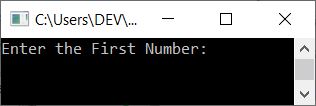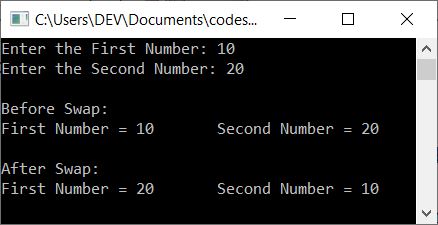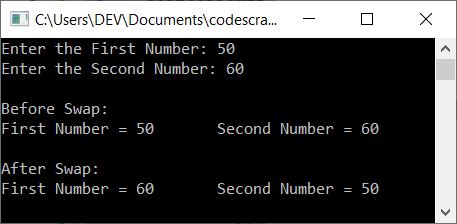- C++ Programming Examples
- C++ Programming Examples
- C++: Hello World
- C++: Get Input
- C++: Print Integer
- C++: Add two numbers
- C++: Add, Sub, Multiply, Div
- C++: Add Digits
- C++: Find Average and Percentage
- C++: Find Arithmetic Mean
- C++: Sum of n Natural Numbers
- C++: Sum of n Numbers
- C++: Square's Area and Perimeter
- C++: Rectangle's Area and Perimeter
- C++: Triangle's Area and Perimeter
- C++: Area and Circumference
- C++: Find Simple Interest
- C++: Fahrenheit to Celsius
- C++: Celsius to Fahrenheit
- C++: Print Prime Numbers
- C++: Reverse a Number
- C++: Swap Two Numbers
- C++: Print Multiplication Table
- C++: Find Factorial of a Number
- C++: Find Factors of a Number
- C++: Find HCF and LCM
- C++: Create a Calculator
- C++: Count Digits in a Number
- C++: First and Last Digit Sum
- C++: Product of Number Digits
- C++: Sum of Squares of Digits
- C++: Interchange Digits of Number
- C++ if-else Programs
- C++: Check Even or Odd
- C++: Check Prime or Not
- C++: Check Alphabet or Not
- C++: Check Vowel or Not
- C++: Check Leap Year or Not
- C++: Check Reverse equals Original
- C++: Check Perfect Number
- C++: Check Palindrome or Not
- C++: Check Armstrong or Not
- C++: Divisibility Test
- C++: Find Labor Wage
- C++: Find Discounted Price
- C++: Find Shipping Charge
- C++: Find Telephone Bills
- C++: Calculate Student Grade
- C++: Largest of Two Numbers
- C++: Largest of Three Numbers
- C++ Number Conversion
- C++: Decimal to Binary
- C++: Decimal to Octal
- C++: Decimal to Hexadecimal
- C++: Binary to Decimal
- C++: Binary to Octal
- C++: Binary to Hexadecimal
- C++: Octal to Decimal
- C++: Octal to Binary
- C++: Octal to Hexadecimal
- C++: Hexadecimal to Decimal
- C++: Hexadecimal to Binary
- C++: Hexadecimal to Octal
- C++ Pattern Programs
- C++: Pattern Programs
- C++: Print Diamond Pattern
- C++: Print Floyd's Triangle
- C++: Print Pascal's Triangle
- C++ Array Programs
- C++: 1D Array Program
- C++: Linear Search
- C++: Binary Search
- C++: Largest Element in an Array
- C++: Smallest Element in an Array
- C++: Find Second Largest Element
- C++: Find Second Smallest Element
- C++: Sum of All Elements
- C++: Multiply All Elements
- C++: Element in Even Position
- C++: Element in Odd Position
- C++: Print Even Numbers in Array
- C++: Print Odd Numbers in Array
- C++: Count Even or Odd Numbers
- C++: Sum of Even or Odd Numbers
- C++: Count Positive, Negative, Zero
- C++: Reverse an Array
- C++: Insert an Element
- C++: Delete an Element
- C++: Merge two Arrays
- C++: Bubble Sort
- C++: Selection Sort
- C++: Insertion Sort
- C++: Common Elements
- C++: 2D Array Programs
- C++: Add Two Matrices
- C++: Subtract Two Matrices
- C++: Transpose Matrix
- C++: Multiply Two Matrices
- C++: 3D Array Programs
- C++ String Programs
- C++: Print String
- C++: Find String Length
- C++: Compare Two Strings
- C++: Copy String
- C++: String Concatenation
- C++: Reverse a String
- C++: Delete Vowels from a String
- C++: Delete a Word from a String
- C++: Count Characters in a String
- C++: Count Words in a String
- C++: Frequency of Words
- C++: Remove Spaces from Strings
- C++: Sort a String
- C++: Uppercase to Lowercase
- C++: Lowercase to Uppercase
- C++: Swap Two Strings
- C++: Check the Anagram or Not
- C++: Capitalize All Words in a String
- C++: Get Numbers from a String
- C++ File Programs
- C++: Read a File
- C++: Write Content to a File
- C++: Append Data to a File
- C++: Read and Display File
- C++: Copy a File
- C++: Merge Two Files
- Count Characters in a File
- C++: Capitalize Every Word
- C++: List Files in Directory
- C++: Delete a File
- C++: Encrypt and Decrypt a File
- C++ Misc Programs
- C++: Print ASCII Value
- C++: Add Binary Numbers
- C++: Generate Random Numbers
- C++: Print a Smiling Face
- C++: Days into Years and Months
- C++: Add Two Numbers using Pointer
- C++: Print Fibonacci Series
- C++: Generate Armstrong Numbers
- C++: Find nCr and nPr
- C++: Get IP Address
- C++: Print Date and Time
- C++: Shutdown and Restart Computer
- C++ Programming Tutorial
- C++ Tutorial
C++ Program to Swap Two Numbers
In this article, you will learn and get code to swap any two numbers entered by the user at run-time using a C++ program. Here is the list of programs available in this article:
- Swap two numbers using the third variable
- Swap two numbers Without using the third variable
- Swap two numbers using a user-defined function (call by reference)
- Using class and object, swap two numbers
Swap two numbers using the third variable in C++
To swap two numbers in C++ In the programming, you have to ask the user to enter the two numbers. The two entered numbers are saved in two places. Let's call them numOne and numTwo. Now, using its variable, swap both numbers as shown in the program below:
#include<iostream> using namespace std; int main() { int numOne, numTwo, temp; cout<<"Enter the First Number: "; cin>>numOne; cout<<"Enter the Second Number: "; cin>>numTwo; cout<<"\nBefore Swap:\n"; cout<<"First Number = "<<numOne<<"\tSecond Number = "<<numTwo; temp = numOne; numOne = numTwo; numTwo = temp; cout<<"\n\nAfter Swap:\n"; cout<<"First Number = "<<numOne<<"\tSecond Number = "<<numTwo; cout<<endl; return 0; }
This program was built and runs under the Code::Blocks IDE. Here is its sample run:

Now enter 10 as the first number and 20 as the second number.Press ENTER to swap these two numbers and print the value of both variables (that store these two values, say numOne and numTwo) before and after the swap, as shown in the snapshot given below:

We've used a third variable, let's say temp, to aid in the swapping of two numbers.That is, the value of numOne gets stored in temp, and the value of numTwo gets stored in numOne. And finally, the value of temp (numOne's value) gets stored in numTwo. Swapping is accomplished in this manner.
Swap two numbers without using a third variable in C++
To swap two numbers without using a third variable, just replace the following three lines of code (from the previous program):
temp = numOne; numOne = numTwo; numTwo = temp;
with the block of code given below:
numOne = numOne + numTwo; numTwo = numOne - numTwo; numOne = numOne - numTwo;
Also, remove the declaration of the temp variable from the program. Everything else will remain the same.
Let's suppose the user enters 10 and 20 as the first and second numbers. As a result, numOne = 10 and numTwo = 20. Now, using the three lines of code listed above. That is, after executing the following statement:
numOne = numOne + numTwo;
10+20 or 30 is assigned to numOne. So numOne=30. And using the following (second) statement:
numTwo = numOne - numTwo;
30-20 or 10 is assigned to numTwo. So numTwo=10. And using the third statement, that is:
numOne = numOne - numTwo;
30-10 or 20 is assigned to numOne. So numOne=20. In this way, swapping gets performed without using a third variable.
Swap Two Numbers in C++ Using a Function (Call by Reference)
This program does the same job as the previous program. But using a user-defined function named swapFun() uses call-by-reference. Let's have a look at the program first:
#include<iostream> using namespace std; void swapFun(int *, int *); int main() { int numOne, numTwo; cout<<"Enter the First Number: "; cin>>numOne; cout<<"Enter the Second Number: "; cin>>numTwo; cout<<"\nBefore Swap:\n"; cout<<"First Number = "<<numOne<<"\tSecond Number = "<<numTwo; swapFun(&numOne, &numTwo); cout<<"\n\nAfter Swap:\n"; cout<<"First Number = "<<numOne<<"\tSecond Number = "<<numTwo; cout<<endl; return 0; } void swapFun(int *nOne, int *nTwo) { int temp; temp = *nOne; *nOne = *nTwo; *nTwo = temp; }
In the above program, inside the main() function, swapFun() gets called. It takes two arguments of the int pointer type. Therefore, we've passed the addresses of both variables, say, "numOne" and "numTwo," that hold the first and second numbers entered by the user.
Note: The * is called as the value at and & is called as the address of operator.
In this way, the address of both values (entered by the user) gets passed to the function swapFun(). Now using the * operator, we accessed the value at address and swap the numbers.
Swap Two Numbers Using a Class in C++
This program uses classes and objects, an object-oriented feature of C++, to swap two numbers.
#include<iostream> using namespace std; class CODESCRACKER { public: void swapFun(int *, int *); }; void CODESCRACKER::swapFun(int *nOne, int *nTwo) { int temp; temp = *nOne; *nOne = *nTwo; *nTwo = temp; } int main() { int numOne, numTwo; cout<<"Enter the First Number: "; cin>>numOne; cout<<"Enter the Second Number: "; cin>>numTwo; cout<<"\nBefore Swap:\n"; cout<<"First Number = "<<numOne<<"\tSecond Number = "<<numTwo; CODESCRACKER c; c.swapFun(&numOne, &numTwo); cout<<"\n\nAfter Swap:\n"; cout<<"First Number = "<<numOne<<"\tSecond Number = "<<numTwo; cout<<endl; return 0; }
Here's a sample run with user input, with 50 as the first number and 60 as the second:

An object c of type (class) CODESCRACKER is created inside the main() function. Now, through this object, we've called the member function swapFun() of the class CODESCRACKER using the dot (.) operator. Now the function operates in a similar way as a normal function does.
The same program in different languages
« Previous Program Next Program »